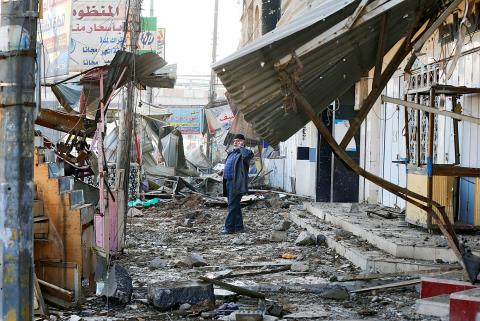The estimated 750,000 people living in militant-controlled west Mosul are in grave danger, the UN warned yesterday, 100 days into a massive Iraqi operation to retake the city.
“We are relieved that so many people in the eastern sections of Mosul have been able to stay in their homes,” UN humanitarian coordinator for Iraq Lise Grande said in a statement. “We hope that everything is done to protect the hundreds of thousands of people who are across the river in the west. We know that they are at extreme risk and we fear for their lives.”
On Oct. 17 last year, tens of thousands of Iraqi forces launched an offensive — Iraq’s largest military operation in years — to retake the nation’s second city from the Islamic State group.

Photo: Reuters
The going has been tough for federal forces as the Islamic State group has defended its last remaining major stronghold in Iraq fiercely. All central neighborhoods on the east bank of the Tigris River that divides the city have now been retaken and commanders are devising a strategy to tackle the western side of the city.
The slightly smaller western side is even more densely populated than the east and it is home to some of the militants’ traditional bastions.
All bridges over the Tigris in Mosul are unusable and the narrow streets of the Old City would make any military offensive into west Mosul a perilous operation both for Iraqi forces and civilians.
In most other urban battles Iraq has waged against the Islamic State group since it took over a third of the nation in 2014, cities had been almost emptied of their population by the time federal forces moved in, but in Mosul, while about 180,000 people have been displaced since the start of the operation, 550,000 residents also stayed in their homes.

Yemen’s separatist leader has vowed to keep working for an independent state in the country’s south, in his first social media post since he disappeared earlier this month after his group briefly seized swathes of territory. Aidarous al-Zubaidi’s United Arab Emirates (UAE)-backed Southern Transitional Council (STC) forces last month captured two Yemeni provinces in an offensive that was rolled back by Saudi strikes and Riyadh’s allied forces on the ground. Al-Zubaidi then disappeared after he failed to board a flight to Riyadh for talks earlier this month, with Saudi Arabia accusing him of fleeing to Abu Dhabi, while supporters insisted he was

The Chinese Embassy in Manila yesterday said it has filed a diplomatic protest against a Philippine Coast Guard spokesman over a social media post that included cartoonish images of Chinese President Xi Jinping (習近平). Philippine Coast Guard spokesman Jay Tarriela and an embassy official had been trading barbs since last week over issues concerning the disputed South China Sea. The crucial waterway, which Beijing claims historic rights to despite an international ruling that its assertion has no legal basis, has been the site of repeated clashes between Chinese and Philippine vessels. Tarriela’s Facebook post on Wednesday included a photo of him giving a

Syrian President Ahmed al-Sharaa on Sunday announced a deal with the chief of Kurdish-led forces that includes a ceasefire, after government troops advanced across Kurdish-held areas of the country’s north and east. Syrian Kurdish leader Mazloum Abdi said he had agreed to the deal to avoid a broader war. He made the decision after deadly clashes in the Syrian city of Raqa on Sunday between Kurdish-led forces and local fighters loyal to Damascus, and fighting this month between the Kurds and government forces. The agreement would also see the Kurdish administration and forces integrate into the state after months of stalled negotiations on

‘MOBILIZED’: While protesters countered ICE agents, Minnesota Governor Tim Walz activated the state’s National Guard to ‘support the rights of Minnesotans’ to assemble Hundreds of counterprotesters drowned out a far-right activist’s attempt to hold a small rally in support of US President Donald Trump’s latest immigration crackdown in Minneapolis, Minnesota, on Saturday, as the governor’s office announced that National Guard troops were mobilized and ready to assist law enforcement, although not yet deployed to city streets. There have been protests every day since the US Department of Homeland Security (DHS) ramped up immigration enforcement in the Twin Cities of Minneapolis and Saint Paul by bringing in more than 2,000 federal officers. Conservative influencer Jake Lang organized an anti-Islam, anti-Somali and pro-US Immigration and Customs Enforcement